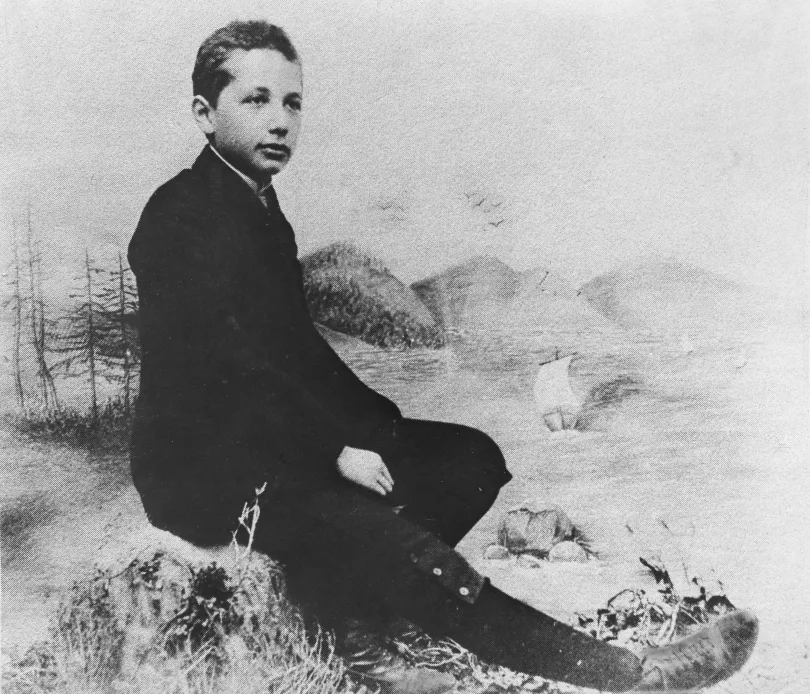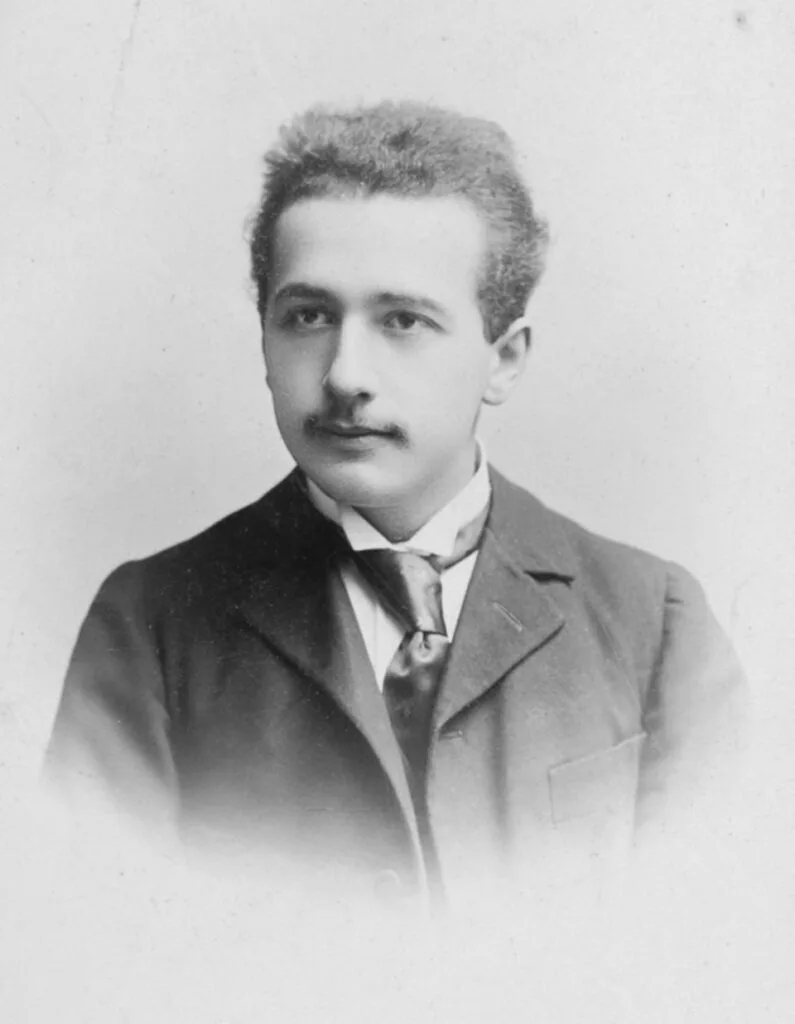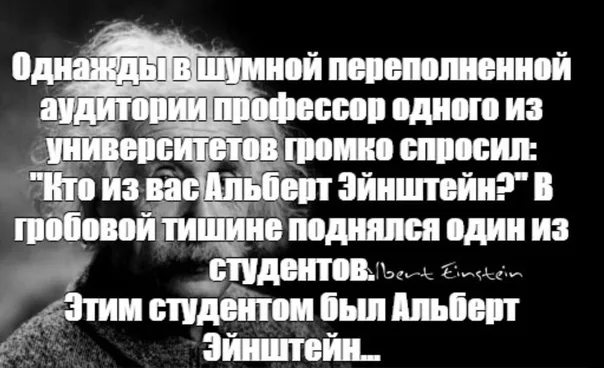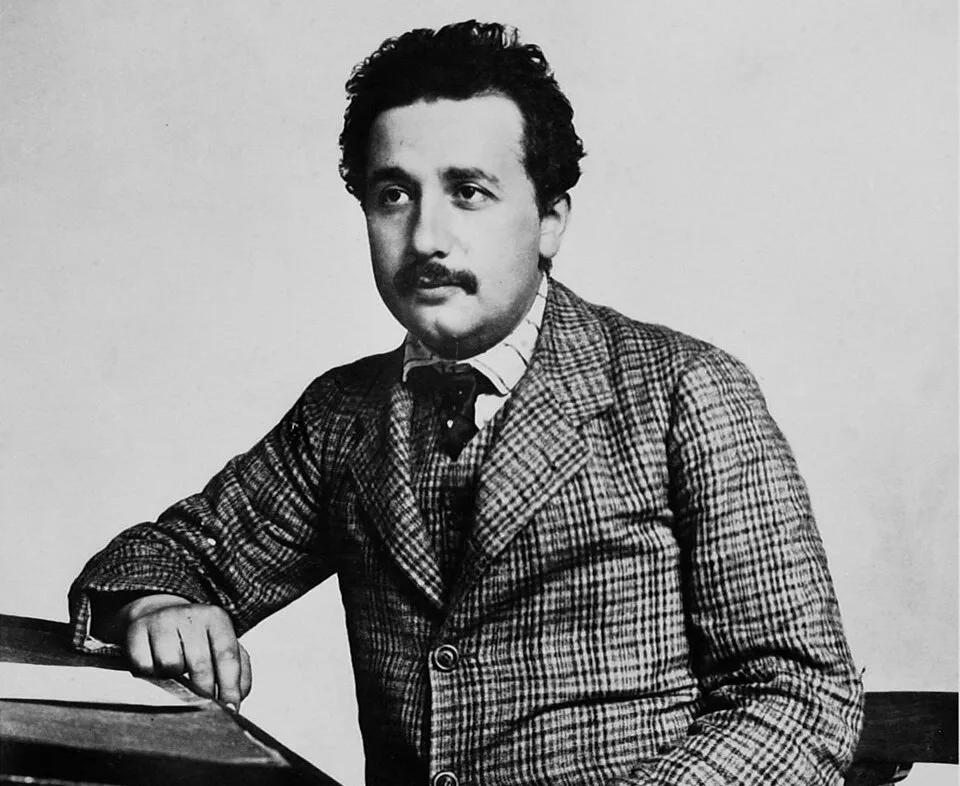There is a popular story on the Internet about how a university teacher tried to prove to the audience that if evil exists, then God is evil, but one of the students was able to refute his arguments. This student is said to have been Albert Einstein. We decided to check whether a similar incident actually happened to the physicist.
The most common version of the story about a religious dispute between a professor and a student is as follows: the teacher argues that if there is evil in the world, and God created everything that exists, then God is evil; the student gives counterexamples from physics and counters that evil is, on the contrary, the absence of God. The arguments and counter-arguments vary from publication to publication, but in the end it invariably turns out that the student who baffled his professor was the young Einstein.
This story is often found on information And entertaining portals, resourcesdedicated to religion, websites With collections of quotes And aphorisms famous personalities. Internet users share it on their pages on social networks (“VKontakte", Instagram, Facebook) and on blogging platforms (“Zen", LiveJournal), discuss it on forums and in services questions and answers. The text of the story has gone so viral and has been online for so long that the phrase “that student was Albert Einstein” has become a meme, used when people want to demonstrate doubt about the veracity of a story.
During his student years, the future Nobel laureate Albert Einstein did not shine with grades. In 1896, not without difficulties, he entered the Federal Institute of Technology in Switzerland. For the next four years of his studies, Einstein was not a model student and skipped lectures that seemed boring to him, preferring to study a lot on his own. The teachers were also not happy with him, and upon completion of his studies (the only one on the course) they did not offer him to stay and work at the institute. It would be entirely conceivable that a wayward student might have had a similar dispute with one of the professors, provided that the student had noticeable religious zeal.

Despite the fact that parents Einstein were non-religious Jews, he himself went to Catholic school as a child and, according to his own words, until the age of 12, he was a deeply religious child. But then, thanks to reading popular science books, he, as stated in the scientist’s autobiography, came to the conviction that much of the biblical stories could not be true. “The consequence of this was a downright fanatical rampant of free-thinking, combined with the impression that the state was deliberately deceiving young people,” wrote the future nobel laureate. That is, by the age of 17 (it was at this age that Einstein entered the institute), the young man was hardly religious enough to argue on this topic with atheist professors. Later, in 1915, he wrote to his Swiss colleague Edgar Meyer: “God punishes so many of his children for their many stupidities for which only he himself can be responsible; in my opinion, only its non-existence could justify it.” These words are more likely to correspond to the thoughts of the professor from the story being analyzed, rather than the student arguing with him.
However, despite the quote mentioned in the previous paragraph, Einstein was not an atheist and did not deny the existence of God. The German diplomat and anti-fascist Hubertus zu Loewenstein recalled how a scientist once said to him: “In the face of such harmony in the cosmos as I, with my limited human mind, can recognize, there are still people who say that there is no God. But what really angers me is that they quote me to support such views.” However, Einstein was not talking about a personified God, as he is understood in monotheistic religions and in which the future Nobel laureate believed in his childhood. When asked in 1929 whether he believed in God, the scientist replied: “I believe in Spinoza’s God, who manifests himself in the natural harmony of the world, and not in a God who cares about the fate and deeds of mankind.” Philosopher Baruch Spinoza, who lived in the Netherlands in the 17th century thoughtthat God is an eternal and infinite entity, unique in the Universe, and everything else that exists in this Universe stems from this essence and is part of it. This concept also somewhat contradicts the position of the student in the conversation with the professor, since, according to Spinoza, everything that exists is a part of God, therefore there can be no absence of God in the Universe.

Whatever Einstein’s views on God and his relationship with evil, “Verified” did not find a description of the alleged dispute with an atheist professor in any authoritative source dedicated to the biography and/or works of the Nobel laureate. In the largest electronic archives of physics collected Hebrew University in Jerusalem, and also Princeton And California Tech universities in the USA, it was not possible to find a story about such a dialogue or similar statements by the scientist. In a collection of Einstein quotes The Ultimate Quotable Einstein, published by researchers at Princeton University, there is an entire section devoted to the physicist’s statements about God and religion, but there are no words like the viral text there. They do not mention such an episode and biographers scientist.
According to project fact checkers Snopes, this story began to spread in the English-language segment of the Internet back in the late 1990s in the form of an email newsletter. It turned out that the story of a militant atheist professor, defeated by the arguments of a believing student, is quite popular. Moreover, if in Russian the version about Einstein has mainly taken root, in English there is much greater diversity. IN one from the versions, the professor turns to God with the demand to push him off the platform in order to prove his existence. After some time, one of the students - a Marine - pushes the professor himself, claiming that God was busy and sent him in his place. IN another the student counters the argument “If no one has seen God, then he does not exist” by saying that no one has seen the professor’s brains either, therefore, he has no brains. Of course, a nameless student or Navy SEAL does not have the same authority as a Nobel laureate, which is probably why Einstein was added to one version of the atheist professor story.
By the way, the authors of some Russian-language publications also include the argument about the professor’s lack of a brain into the texts about the student Einstein, thus replacing the much more logical ending about evil as the absence of God and somewhat reducing the degree of pathos in this story.

This is not the only and far from the first time that Einstein is credited with words that he never said, or he is made the hero of events in which he did not take part. For example, "Verified" previously refuted the following story: as a teacher, a physicist made a mistake in multiplication in front of the whole class, and then explained to the laughing students that they should not pay attention to such a reaction from people and allow themselves to be demotivated. Einstein did not invent puzzle, which supposedly only 2% of the world's population can solve.
Thus, no evidence could be found that Einstein ever argued with his professor about the existence of God. The scientist talked a lot about faith, but his views were far from the position described in the viral story. The plot, in which a religious student defeats the arguments of an aggressive atheist professor (sometimes with wit and sometimes with brute force), is very popular in the English-speaking segment of the Internet. Apparently, the Nobel laureate was included in one version of such stories simply because of his fame.
Cover photo: Lucien Chavan [1] (1868–1942), a friend of Einstein's when he was living in Berne, Public domain, via Wikimedia Commons
Read on the topic:
- Snopes. Did an Atheist Professor Test God by Dropping a Breakable Object?
- Is it true that Einstein is the author of the quote about two ways to live life?
- Did Albert Einstein say: “Only a fool needs order—genius rules over chaos”?
If you find a spelling or grammatical error, please let us know by highlighting the error text and clicking Ctrl+Enter.






